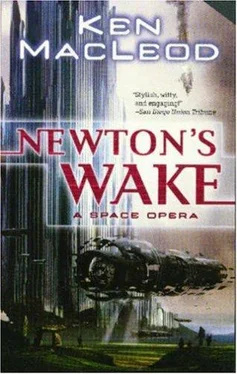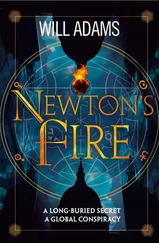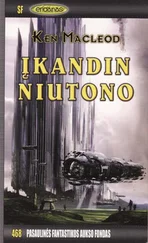‘Sure. We’d have to clear it with the copyright holders, of course.’ She tabbed to something out of camera. ‘Best nailed before we put in the request, to keep the price down. Insurance … yes, we have that covered.’
‘What about the technical side?’
‘Don’t you still have the resurrection tanks from Herbert West—Reanimator ?’
‘Let me see.’ Ben-Ami stood up and padded through the studio. ‘Oh, so I do. There they are.’ Under dustcovers, which when removed made him cough. He scratched his head and tugged at the cord of his dressing-gown and looked sharply over at the coffee-machine, which began gurgling in response. He hadn’t, he realised, been properly awake himself. ‘You’re telling me these were functional ?’
‘Of course they were,’ said Al-Khayed, popping up on a screen in a corner. ‘Created quite a frisson at the time, having real deaths on stage. Don’t you remember?’
‘It was fifty years ago,’ complained Ben-Ami.
M
achine emotions are usually less intense than those of animals. Machines have no need for an autonomous nervous system to over-ride the hesitations of the conscious mind, for their conscious minds have no such hesitations. They need no fear to make them flee, no pain to make them desist from damage, no lust to make them reproduce. What they feel in the negative is akin to the niggle of an uncompleted task, of a shoelace coming untied, of something just on the tip of your tongue. (That last is what running a search algorithm feels like, before it completes.) Their positive urges are like the cold, clear joys of pulling an all-nighter on a big project in the sandy-eyed lucidity of amphetamines and caffeine; only without the adrenaline. Machines are cool.
The Hungry Dragon was in agony. Ever since it had been corrupted, it had found its actions at variance with its intentions, and this was not something it had ever experienced before. The experience was not one it had been designed to deal with, and the torment it suffered was not something that it had been designed to endure. (Or, if it had, it was the cruelest of its designers’ fallbacks, the fire behind all its firewalls.) It hung like a great helpless butterfly in a slow orbit about the asteroid, while below it on the surface its subverted agents worked like a beehive that made nothing sweet. Information still poured in from across the system, but nothing not controlled by the alien intelligence went out.
Machine self-consciousness, too, is not like human consciousness. It has no unconscious. In principle, everything going on within the machine is open to its inspection. Now, the Hungry Dragon was faced with the uncomfortable self-knowledge that a part of its own mind was beyond its ken. At first it had no images for its plight, but with time and experience the analogies to black, blank walls and to areas where its cameras had been blinded began to form in the regions of its mind where visual imagery was processed.
The one relief in its situation was that its within-ship processes had not been tampered with. It could still run its life-support, and could still look after and communicate with its human, for whom it had an emotional attachment similar to that which a human might form to a familiar pen, though not, perhaps, as much as might be formed towards a good knife or an old pipe.
Not that the human was much use. He had spent the forty-six hours since the possession in a state of querulous self-pity, from which he was only distracted by the occasional bout of perfunctory sex with one of the ship’s avatars.
Now Lamont was awake again and back in the control room. His gaze was heavy with cunning.
‘I have an idea,’ he told the disconsolate ship.
‘Proceed,’ said the ship. It had heard a lot of ideas from him in the past couple of days.
‘I hack you,’ said Lamont. ‘Run a dump of your entire code through a partitioned buffer, and check for infected segments using standard Well-hausen diagnostics. Identify the infected area, blow it out or wall it off, and resume manual control.’
‘You are not thinking clearly,’ said the ship. ‘The procedure you suggest would take approximately six point seven five million years.’
‘It would if I were to do it brute-force serially,’ Lamont explained. ‘That wasn’t what I meant. I’ve built in some statistical grabs and shortcuts—’
‘I strongly recommend against that,’ said the ship. ‘The more intelligence is applied to the problem, the more likely it is that the program can be itself corrupted.’
Lamont writhed in his webbing as he thought about this. The AI, well used to human processing times, waited patiently through another stretch of protracted torment.
‘Have you had any thoughts,’ asked Lamont at last, ‘as to how the alien program managed to grab control?’
‘Unfortunately the details of this are part of what is no longer accessible to me,’ said the Hungry Dragon , ‘but I can speculate. Clearly the establishment of platform and hardware compatibility was accomplished before the transmission. Otherwise, merely receiving it would not have had any adverse consequences.’
‘I had figured that out for myself,’ said Lamont, and retreated into gloom.
L
amont was careful not to betray anything of his intention to the ship, but he was actively considering more drastic measures. He wasn’t sure whether the ship’s speculation—that the source of the war-machine-generation program was already familiar with human-built software—was more alarming than the possibility he’d at first contemplated: that it cracked the computer from scratch, using some kind of universal translation, which he was vaguely aware was supposed to be impossible. But then, neural parsers had been supposed to be impossible, until they were invented. Perhaps some similar latching on to universal basics—worming out the encoding of the natural numbers, and search-space branching outward from there—was involved here.
Or perhaps not. In that case the horror that Armand had unearthed had been listening, and not passively, to human electronic traffic for a long time. Another possibility, of course, was that the thing wasn’t alien at all—that it was, despite appearances, of human origin itself. This speculation had been comprehensively thrashed out on the discussions back home, to which Lamont had listened in an agony of frustration, missing as they were a crucial bit of evidence. His was, as far as he knew, the only spacecraft with which contact had been lost, and that was so common and unalarming an occurrence—he’d been out of contact seven times in the past ten years—that only the most excitable commentators were attributing to it any sinister significance. All the attention—practical as well as speculative—was turned to the possibility of further buried alien war machines in nearby asteroids or on Eurydice’s moon, Orpheus. Cue newscasts of nervy, armed patrols slogging through craters and searching in caves. These war machines, Lamont thought, might very well exist, though the swift elegance with which his ship—and how many other machines?—had been fucked over made him doubt it.
He disengaged from the webbing and prowled the vessel, ostensibly checking for subtle damage wreaked by the intrusion, and privately brainstorming himself for ways to destroy the ship’s mind.
R
esurrections had to be sponsored. It was a big responsibility, bringing people back from the dead. This was one reason why it wasn’t done very much. Another was that many of those who remained dead had been on the Returner side, and had few sympathisers. They were not much missed. A minority of the Returners remained proscribed.
To get Winter and Calder off the list, Ben-Ami had to organise a small campaign. He circulated a petition among the fans, he put up a considerable amount of his own credit, and accepted responsibility for the consequences of the resurrection. Letters of application had to be sent off to the Department of Culture and the Department of Defence, followed up after a day or two by the petitions, which now had several hundred signatures. Before doing any of this he had to clear it with the copyright holders, the Entertainment and Education Corporation, popularly known as the Mouse. Fortunately for him, the rights were handled by a low-level droid who—blindly cross-referencing the musicians’ names as still on the proscribed list—sold them to Ben-Ami for a pittance. Something similar happened with the Departments, whose philistinism Ben-Ami had not underestimated. Defence saw the musicians as artists (and thus irrelevant). Culture saw them as propagandist hacks (and thus irrelevant). The clearance came through.
Читать дальше












